- Home
- Pat Conroy
South of Broad Page 3
South of Broad Read online
Page 3
Of all the elements of my childhood that rang a false note, I was the only kid in the American South whose mother had received a doctorate by writing a perfectly unreadable dissertation on the religious symbolism in James Joyce’s equally unreadable Ulysses, which I considered the worst book ever written by anyone. June 16 was the endless day when Leopold Bloom makes his nervous Nellie way, stopping at bars and consorting with whores and then returning home to his horny wife, Molly, who has a final soliloquy that goes on for what seemed like six thousand pages when my mother force-fed me the book in tenth grade. Joyce-nuts like my mother consider June 16 to be a consecrated mythical day in the Gregorian calendar. She bristled with uncontrollable fury when I threw the book out the window after I had finished it following an agonizing six months of unpleasurable reading.
It took me seconds to dress in my surplice and cassock, then I stood before the radiant, comely monsignor as he admired his own image in the mirror. Ever since I had known him I had heard the women of the parish whisper “What a total waste” when their stylish movie star of a priest floated out toward the altar in all his gallant finery.
“Happy Bloomsday, Monsignor Max,” I said.
“Don’t make fun of your mother, young man. Ulysses is her passion, James Joyce the great literary love of her life.”
“I still think it’s weird,” I said.
“One must always forgive another’s passion.”
“I could forgive her if she hadn’t named me Leopold Bloom King. Or my brother Stephen Dedalus King. That’s taking it a little far. Have you ever read Ulysses?”
“Of course not. He is a flagrant anti-Catholic. I’m a Chesterston man myself.”
I felt an old flush of pride as I led the monsignor out to the central altar and spotted my parents in the front row, both of them saying the rosary. My father looked up and smiled when he saw me and gave me an exaggerated wink of his right eye, the one my mother could not see. She tolerated playfulness at church not at all. At every Mass, she wore her game face for a crucifixion as though she were an actual eyewitness to the death of Jesus each time she knelt in her pew.
As he faced the small, mostly octogenarian congregation, Monsignor Max began the Mass in the name of the Father and the Son and the Holy Ghost. The words I heard him utter in his operatic voice washed over me like a clean stream from my boyhood, the delicate latticework of memory and language.
“I will go to the altar of God.”
And I went with him and let the ancient, sacrosanct rhythms of the Church seize me. When the priest called for water, I provided him with water. When he needed to cleanse his hands for the coming mystery, I emptied cruets over his fingers. When he called for wine, I supplied him with wine in the gold shine of chalices. At the moment of consecration, when he turned the wine into the blood of Christ and the bread into the body of the same God, I rang the bells that had sounded beneath altars for two thousand years. When I opened my mouth and received the unleavened bread from the consecrated finger and thumb of the priest, I felt the touch of God on my tongue, His taste in my palate, His bloodstream mingling in my own. I had come back to Him, after a full-pledged embittered retreat, after He stole my brother from my bedroom and killed him in my bathtub.
But I had come back to Him, and that is part of my story.
After Mass, we walked down to Cleo’s restaurant for breakfast, a ritual of summer as ingrained in the texture of our family life as daily Mass. Cleo was a fast-talking Greek girl who ran the cash register as though she were reloading an M16 rifle for snipers. Her patter was endless and profane, until my parents walked in for breakfast and her attitude turned beatific. Both of my parents had taught her when they were at Bishop Ireland High, and she held fast to the respect that high school kids who never go to college continue to feel for the last teachers of their lives. Even the young waitresses displayed new vigor when my parents appeared in the doorway, and Cleo delivered hand signals to the kitchen staff that translated into hot coffee, orange juice, and ice water on the table. Since I was in training for football season, I ordered two eggs over light, grits with redeye gravy, and three slices of bacon. My father would dig into country ham and biscuits with a side order of hash browns. Even though it was the most celebrated day of the year for my mother, she retained the strong-willed discipline that made up every habit of her life: she ordered half a grapefruit and a bowl of oatmeal. My mother admitted to needs such as nourishment, but not of appetites. “Happy Bloomsday, darling,” my father said to my mother, leaning to kiss her on the cheek. “This is your day and your every wish is our command. Isn’t that right, Leo?”
“That’s right,” I said. “We’re at your beck and call.”
“Very good, Leo,” Mother said. “Though you fight me on it, your vocabulary shows constant improvement. Here’s your list of five words to memorize today.” She handed me a piece of folded-over notebook paper.
I made a groaning noise, as I did every morning, and opened the notebook paper to read five words that no one would use in normal conversation: sedulous, perspicacious, ribald, vivisection, and tumid.
“Do you know what any of those words mean?” Mother asked.
“Of course not.” I sipped my coffee.
“Did you memorize the five I gave you yesterday?”
“Of course.”
“Use two of the words in a sentence,” she commanded.
“I felt a certain need to regurgitate when I cogitated on the works of James Joyce.”
My father laughed, but the laughter was stifled when my mother cut her pale eyes toward him. “You heard your father. This is my special day. Bloomsday, a day celebrated all over the world by aficionados of James Joyce.”
“The three of you ought to get together sometime,” I said.
“His admirers are legion,” she said. “Even if I walk alone in my own household.”
“Leo and I are cooking you a special meal tonight,” my father told her. “The menu is taken directly from the text of Ulysses. It was Leo’s idea.”
“Thank you, Leo. That’s very thoughtful of you.”
“I’m not going to eat it. Just cook it,” I said. Although I meant it as a joke, my mother took instant offense. She could freeze me with a gaze that made the dead of winter seem like the best time for planting. From the time I could talk, I heard the men and women of Charleston praise my mother’s physical attractiveness, her immaculate grooming, her stylish carriage. I could always see what they were talking about, but could never fully partake in their pleasure over her textured beauty. For me, her prettiness was easy to admire, but difficult to love. Since the death of Steve, she had rarely kissed me. Hugged me, yes, again and again. But kissed me like she used to do when I was a small boy, no. She had taken little pleasure in my childhood, and I could read her disapproval like a page of newsprint whenever she looked at me. We played hard at looking the part of a happy family, and as far as I knew we succeeded admirably. Only three people in the world knew of our deep and hopeless despair in the company of one another.
The waitress refilled our coffee cups at the same time.
My father’s face was baffled and amused and anxious as he witnessed the chilly interplay between me and my mother. He got dizzy with the goofiest kind of love whenever he was with the two of us, yet his solicitousness and kindness to me always remained a red flag, an arena of sudden warfare between them. My brother’s death had almost killed both my parents, but it did not change my father’s fundamental good nature and graceful optimism. He turned his full attention to me and tried to love me harder because I was not Steve. Unlike my mother, who handled his death in the only way she knew how, so I feared that she could never love anyone again who was not Steve.
“So,” Mother said as she adjusted her lipstick in a compact mirror. That gesture was a signal to the waitress that our breakfast had ended and she was free to clear the dishes. “Your father knows the orders of the day. Leo, I want you to bake two dozen chocolate chip cookies for the n
ew neighbors who are moving in today across the street from us, a set of twins. Your age, exactly, and they’ll be your classmates at Peninsula.”
“Okay. What else?” I asked.
“I got a call from Sister Mary Polycarp at the orphanage. They received two new orphans from Atlanta. Both runaways. They too are brother and sister. You will welcome them to Charleston. Then you will bird-dog them all year. Watch over them. They’ve had a terrible life.”
“They’ve had great lives. Wait till they spend a year with Polycarp. What a monster! I thought they threw her out of the convent.”
“Wasn’t she the nun who hit that Wallace girl across the eye with a ruler?” Father asked.
“An unfortunate accident,” said my mother.
“I was there,” I said. “She cut her eyeball. Severed the optic nerve. Blinded her.”
“She’s no longer allowed to teach. The order almost expelled her,” Mother explained.
“In the third grade, she hit so many boys in the face and made so many of us bleed that I nicknamed her the Red Cross.”
My father chuckled, but was stopped cold by a sudden glitter in Mother’s eye.
“Very witty, son,” she snapped. “If only some of this wit could translate into solid achievement on your Scholastic Aptitude Test.”
“Leo does not test well, darling,” my father said.
“But isn’t he the life of the party,” she said. “This afternoon I want you to report to your principal’s office and meet your new football coach.”
“You are my principal, Mother,” I said. “And Coach Ogburn is my football coach.”
“He resigned yesterday.”
“Why on earth?” Father asked. “He was so close to retirement.”
“He refused to coach when he learned his assistant was going to be a black man,” my mother said. “So I hired Coach Jefferson from Brooks High as head coach, and made him athletic director too. They’re not pussyfooting with integration this year.”
“Why do you want me to meet Coach Jefferson?” I asked.
“Because you’re his first-string center.”
“I’ve always played second-string behind Choppy Sargent.”
“Choppy and three others are following Coach Ogburn to a new segregated academy west of the Ashley. Coach Jefferson wants you to try to keep any other of the white boys on the team from following suit.”
I was making a mental list: chocolate chip cookies, the orphans of Polycarp, Coach Jefferson. “Anything else, Mother?”
“You’ve got iced tea duty after the hospital workers’ march. We’ll eat a late dinner.” My mother gave her lipstick a final glance in her mirror, and then met my eye evenly. “Your probation hearing is set for June twenty-sixth. You’re finally finished with probation.”
My father added gratefully, “Your record is clean, son. You have a clean slate again.”
“Not with me, young man,” Mother inserted quickly. “I don’t know how you sleep at night, after what you put your father and me through.”
My father’s voice lowered as he said, “Darling.”
“Leo knows what I mean.” Mother did not look up.
“Do you know what she means, Leo?” Father asked.
“He knows,” my mother shot back.
“Are you talking about my hatred of James Joyce?” I asked.
“You pretend to hate James Joyce because it’s an easier way to say you hate me,” she retorted.
“Tell your mother you don’t hate her, Leo.” Father was a man comfortable with the formulas of scientific law, but lost at sea when it came to engaging the tidal forces of the emotions. “No, tell her you love her. That’s an order.”
“I love you, Mother,” I said, but even I could measure the perfect note of insincerity I sounded.
“Meet me at my office at four this afternoon, Leo,” she said. “You have your other tasks for the day.”
My parents left the table at the same time, and I watched as my father paid Cleo for the meal. Cleo then came over and sat across from me.
“Here’s all the wisdom I got to share, Leo: Being a kid’s a pain in the ass. Being an adult is ten times worse. That’s Cleo the Greek, who came from the people who brought you Plato and Socrates and all those other assholes.”
CHAPTER 2 New Friends
After leaving Cleo’s, I rang the ivory-white button of St. Jude’s orphanage in the warren of intersecting streets behind the cathedral. Its buzz was irritating and subhuman, insectlike. I associated the orphanage with all things Catholic, from rectories to convents.
A huge black man named Clayton Lafayette answered the door and smiled when he saw me. Mr. Lafayette played out a dozen roles at the orphanage, but one was marching the high school kids each day to Peninsula High, a task he performed with military precision and relish. Though his disposition was sunny and affable, his body was brutish.
“Leo the Lion,” he said to me.
“Count Lafayette.” We shook hands. “I’ve got an appointment to see Sister Mary Polycarp.”
“The orphans already call her the Pollywog,” he whispered. “She told me your mama was sending you over.”
“You be careful around the Pollywog, Count,” I whispered back. “She’s bad news.”
I walked the length of a long corridor of a building designed by a man who held an unbelievable grudge against orphans. It was grim to the point of parody, and the woman who sat behind the government-issue steel desk as I entered her office looked congruent with the spectral glooms of the architecture.
Among Roman Catholics of my generation, we play a parlor sport that is mean-spirited and partisan in nature but guaranteed to elicit laughter and to cause blood to pool in our collective memories: we tell nun stories. We have no shame in it, as any religion that flaunts those plaster-of-Paris murdered saints in their sanctuaries and crucifix effigies that seem to compete for the most barbarous slaughter of Jesus, the living God, could certainly produce communicants who could invent atrocities for the women of the veil who whomped our souls into shape in preparation for eternal life. Some of the nuns of our youth in the fifties and sixties ranked among the finest women we would ever encounter. But the nun with the black heart and the most merciless imagination stamped her brand most indelibly. I once had a nun who stood up her class whenever we heard fire sirens pass our school, then led us in the recitation of the Lord’s Prayer that it was not a Catholic home on fire. Another nun would put clothespins on our ears if we acted up in school, and our parents would know by the purple bruises, the dead giveaway that we had displeased the good sister. Like eastern diamondbacks, you could always hear the approach of nuns by the rattling of the sinister beads of their rosaries.
In second grade I had passed a surreptitious note between two boys who were best friends, and the three of us were marched to the front of the room to accept our punishments in full view of the class. Sister Veronica never hit any of her students, but her retaliations were fiendish and inventive. Standing us by the blackboard, she ordered us to hold out our arms like the crucified Christ. In ten minutes this punishment seemed benign. But after an hour Joe McBride burst into tears, his triceps quivering in agony. In contempt she said to Joe, “Jesus had to hold his arms out on the cross for three hours.”
Joe answered through tears, “But Sister! Jesus had help. He had nails.” And the class howled with helpless, forbidden laughter.
That morning at the orphanage, my old fear of nuns formed bile in my throat as I said, “Good morning, Sister Mary Polycarp.”
“Hello, Leo. I taught you, didn’t I? First or second grade?”
“It was third.”
“You were very slow, if I remember correctly.”
“That’s me, Sister.”
“But very polite. You can always tell the ones from good families,” she said. “I read the papers when you were kicked out of Bishop Ireland.”
“Yes, Sister, I made a bad mistake.”
“Didn’t you go to jail or someth
ing?”
“No. They put me on probation,” I said, uncomfortable with this subject, this situation, and this particular nun.
“I didn’t think you were very smart,” she said. “But I never thought you would be a convict.”
“Probation. Not jail, Sister.”
“Same difference to me.” She studied two files on her desk. “Did your mother tell you about our big problem?”
“No, Sister. She told me to meet two kids who would be rising seniors, and help them make the adjustment to their new high school.”
“Did she tell you they are both thieves, liars, criminals, and runaways? Add to my list of complaints, the diocese is sending over five colored orphans this afternoon.”
“No, Sister. She didn’t tell me any of that.”
“Since you’ve spent time in prison and reformed yourself, I thought you might be good for them. Lead them in the right direction, so to speak. But I warn you, they’re very clever and both are natural-born liars. They are from the North Carolina mountains, way up in the hills, and there’s no kind of white trash like mountain trash. That’s a sociological fact. Do you know I’ve got a master’s degree in sociology, Leo?”
“No, Sister, I didn’t.”
“They’re in the library waiting for you. Mr. Lafayette will be watching from a distance—to make sure there is no trouble,” she said.
“What kind of trouble could there be? I’m just going to tell them what to expect from the high school.”
“In the world of orphanages, these two are called long riders because they’ve run away so often,” she informed me. “They’ve been in orphanages from New Orleans to Richmond, Birmingham to Orlando. Long riders are kids looking for something they’re never going to find because it doesn’t exist in the first place. Their names are Starla and Niles Whitehead. Both are very bright. He’s flunked a grade on purpose, but that’s because he wanted to be with his sister.”
I walked down to the library, which lay on the opposite side of the orphanage, where every Christmas, my father, dressed as an underweight Santa Claus, handed out gifts to the orphans. It was one of those sad-sack libraries overflowing with books that had never been checked out. There was an eerie relationship between the cast-off children and the unopened books, but I was too young to make those kinds of analogies when I entered the huge room to meet Starla and Niles Whitehead. The two of them sat in the rear and looked about as welcoming as scorpions in a bottle, their hostile gazes unnerving me. It surprised me how attractive they were, both with high cheekbones and the fine chiseled features that hinted at a Cherokee bloodline. As I took a chair in front of them, they studied me, the sister with eyes a deep shade of brown that suggested melted chocolate.

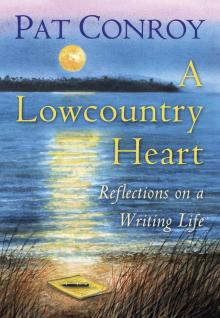 A Lowcountry Heart: Reflections on a Writing Life
A Lowcountry Heart: Reflections on a Writing Life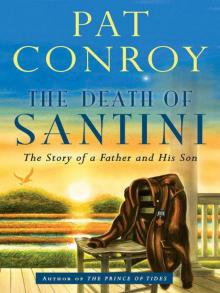 The Death of Santini: The Story of a Father and His Son
The Death of Santini: The Story of a Father and His Son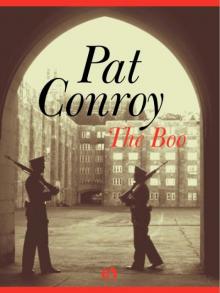 The Boo
The Boo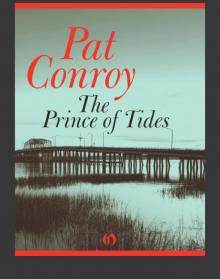 The Prince of Tides
The Prince of Tides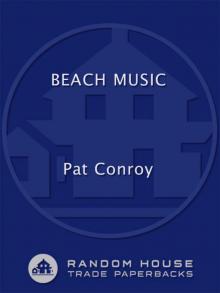 Beach Music
Beach Music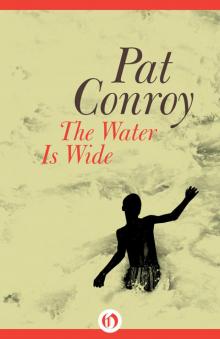 The Water Is Wide
The Water Is Wide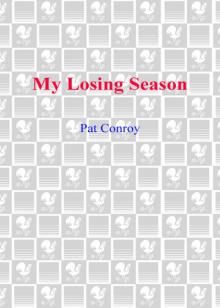 My Losing Season
My Losing Season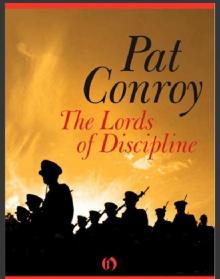 The Lords of Discipline
The Lords of Discipline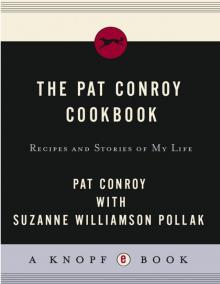 Pat Conroy Cookbook
Pat Conroy Cookbook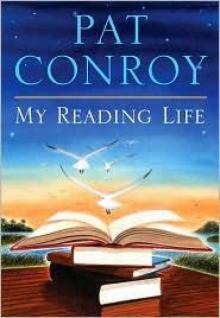 My Reading Life
My Reading Life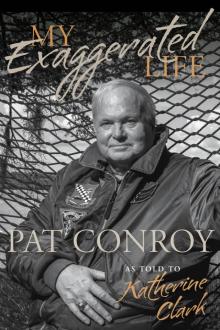 My Exaggerated Life
My Exaggerated Life The Pat Conroy Cookbook
The Pat Conroy Cookbook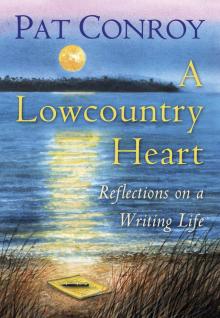 A Lowcountry Heart
A Lowcountry Heart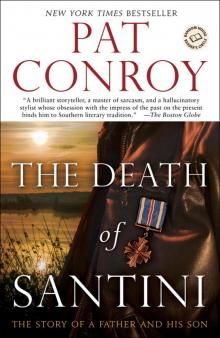 The Death of Santini
The Death of Santini